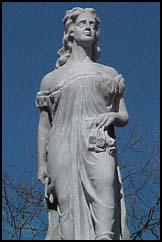Hannah Duston

Hannah Duston was born in 1657 and after marrying Goodman Dunston lived in Haverhill, Massachusetts Bay. On 9th March, 1697, Hannah gave birth to her twelfth child, Martha. The following week the village was attacked by a group of Native Americans. Over the next few minutes 27 white settlers were killed.
Hannah and her daughter were kidnapped. On the journey back to the Indian camp, Martha was murdered by the warriors. However, Hannah, a neighbour, Mary Neff, and a 14 year old boy, Samuel Lennardson, were kept alive.
On 30th March, 1697, the three captives were able to escape after using tomahawks to kill ten of the guards. Travelling my night and hiding during the day, Hannah Duston, Mary Neff and Samuel Lennardson eventually reached Haverhill.
Hannah Duston was considered to be a heroine, and was the first woman in the United States to have a monument erected in her honour.
Primary Sources
(1) Nathaniel Hawthorne, The Duston Family, The American Magazine of Useful and Entertaining Knowledge (May 1836)
Goodman Duston and his wife, somewhat less than a century and a half ago, dwelt in Haverhill, at that time a small frontier settlement in the province of Massachusetts Bay. They had already added seven children to the King's liege subjects in America; and Mrs. Duston about a week before the period of our narrative, had blessed her husband with an eighth. One day in March, 1698, when Mr. Duston had gone forth about his ordinary business, there fell out an event, which had nearly left him a childless man, and a widower besides. An Indian war party, after traversing the trackless forest all the way from Canada, broke in upon their remote and defenceless town. Goodman Duston heard the war whoop and alarm, and, being on horseback, immediately set off full speed to look after the safety of his family. As he dashed along, he beheld dark wreaths of smoke eddying from the roofs of several dwellings near the road side; while the groans of dying men, - the shrieks of affrighted women, and the screams of children, pierced his ear, all mingled with the horrid yell of the raging savages. The poor man trembled yet spurred on so much the faster, dreading that he should find his own cottage in a blaze, his wife murdered in her bed, and his little ones tossed into the flames. But, drawing near the door, he saw his seven elder children, of all ages between two years and seventeen, issuing out together, and running down the road to meet him. The rather only bade them make the best of their way to the nearest garrison, and, without a moment's pause, flung himself from his horse, and rushed into Mrs. Duston's bedchamber.
The good woman, as we have before hinted, had lately added an eighth to the seven former proofs of her conjugal affection; and she now lay with the infant in her arms, and her nurse, the widow Mary Neff, watching by her bedside. Such was Mrs. Duston's helpless state, when her pale and breathless husband burst into the chamber, bidding her instantly to rise and flee for her life. Scarcely were the words out of his mouth, when the Indian yell was heard: and staring wildly out of the window, Goodman Duston saw that the blood-thirsty foe was close at hand. At this terrible instant, it appears that the thought of his children's danger rushed so powerfully upon his heart, that he quite forgot the still more perilous situation of his wife; or, as is not improbable, he had such knowledge of the good lady's character, as afforded him a comfortable hope that she would hold her own, even in a contest with a whole tribe of Indians. However that might be, he seized his gun and rushed out of doors again, meaning to gallop after his seven children, and snatch up one of them in his flight, lest his whole race and generation should be blotted from the earth, in that fatal hour. With this idea, he rode up behind them, swift as the wind. They had, by this time, got about forty rods from the house, all pressing forward in a group; and though the younger children tripped and stumbled, yet the elder ones were not prevailed upon, by the fear of death, to take to their heels and leave these poor little souls to perish. Hearing the tramp of hoofs in their rear, they looked round, and espying Goodman Duston, all suddenly stopped. The little ones stretched out their arms; while the elder boys and girls, as it were, resigned their charge into his hands; and all the seven children seemed to say. 'Here is our father! Now we are safe!'
